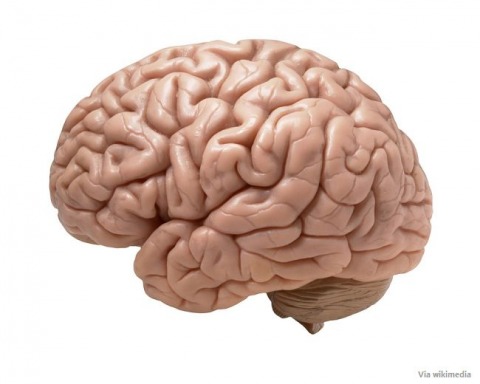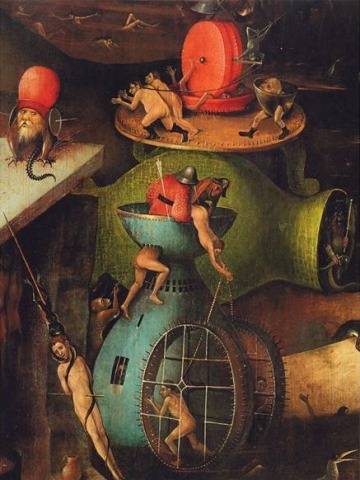
The Underground Thomist
Blog
The Next BurningMonday, 02-12-2024
The next destruction of books will take place as swiftly as the burning of the Great Library of Alexandria. Already libraries are getting rid of physical books and shifting to electronic records. Vandals will delete electronic books by hacking the systems; politicians will delete them for the supposed protection of the republic. Selective electronic book burning will be as easy as pie, because so-called artificial intelligence will be used to scan millions of manuscripts at once for unapproved ideas. Destruction is already taking place willy-nilly, because software and hardware obsolescence increasingly deprive us of the ability to recover documents, files, and recordings more than a few years old. Can you still listen to your old eight-track tape player? Can your DVR-equipped computer still read your old CDs? Can your new computer accept your old floppy disks? The span of electronic memory turns out to be much less than a single generation of man. About ten years ago, I was about to lose access to about 15,000 old documents written in an old word processing program, because the newer versions of MS-Word no longer support DOS. Well-meaning technicians – who thought this was like bringing back the horse-drawn buggy -- told me that there ought to be a way to convert my documents all at once. Even after research, though, they couldn’t tell me what it might be. Over a period of weeks, I dropped everything else in order to laboriously convert my files one, by one, by one, by one, by one. “But everything is on the internet now!” Software obsolescence affects a lot of internet files too. Have most of us any idea how fragile such complex systems are, how much coordinated effort by thousands of people they take to maintain? Not to mention how easy they are to manipulate. Consider the algorithms used in social media, which seem so much more efficient in eliminating what our elites call “misinformation” than in eliminating children’s access to pornography. Besides – people read less and less, and the internet has devastated our attention spans. “It will all work out.” Don’t be so sure. We prefer to view prosperity, economic opportunity, political freedom, and religious liberty as facts of nature, like air and gravity. In fact they are delicate achievements which will be lost in an instant if the cultural consensus which supports them disappears. Already this consensus has gravely eroded. In fact, it is under assault, and too often, those who recognize the fact are afraid to speak for fear of being called “partisan,” “polarizing,” on “on the wrong side of history.” People of a certain kind of faith sometimes ask me, “But don’t you believe God is in control?” Yes, but this doesn’t mean that He will preserve our civilization. What it means is that He can save souls and preserve His Church, and that in the end, none of our civilization’s wickedness and insanity will be able to defeat His purposes. If we cannot or refuse to be reformed, we may be swept away -- or allowed to destroy ourselves – or, most likely, both. Cheer up. I don’t say that our civilization can’t be reformed. Gloom and doom are wastes of time and vexations of spirit. Since we don’t know the future, we should always fight to preserve our institutions, never stooping to lie or manipulate, as though we knew that they still can be preserved -- for maybe they can. Prudence, however, requires inward preparation for the very real possibility of their disappearance, well within our lifetimes.
|
Three Bad EggsMonday, 02-05-2024
First egg: Progressive educationAn advertisement for a private school in our neighborhood association newsletter reads as follows (remember, this is Austin): No grades. No homework. No teachers. Apply now. Rolling admissions. I notice that it doesn’t include “No tuition.”
Second egg: Social construction“Gender is a social construction.” No, gender ideology is a social construction. Sex is a work of nature. Gender is confusion about sex.
Third egg: Pragmatism on left and rightThe mantra of leftist humanities professors that truth isn’t how things really are, but “whatever works,” is very much of a piece with the idea of some conservatives that you don't need the humanities: Just get a business degree. One would think that even businessmen would want to pursue the great questions of life, but no. It’s come to this: The barbarians are pillaging the city, and the anti-barbarians respond that this being the case, we have to burn the city down.
Bonus: EmpowermentMeans being told that I may do whatever I want.
|
Conservative Judicial Activism?Monday, 01-29-2024
Query:As a man of the left, I think your critique of how some conservatives are abandoning their former opposition to judicial activism is on point. This theory is a power move from the right. People are getting more radicalized as we speak.
Reply:Well, thanks, but some recent court decisions seem to me not conservative judicial activism, but merely a correction of left-wing judicial activism. I don’t see it as a “power move” to correct previous power moves; quite the contrary. So I am not terribly worried. Yet. Unfortunately, though, you’re right that some conservatives really would like to see a conservative variety of judicial activism. Conservatives ought to champion the rule of law. Decades ago, the left gave up on the rule of law. Some on the right seem to have concluded that things have gone so far that they must fight fire with fire. A conservative young man visited my office some years ago and recited a long list of illegitimate, dishonest, manipulatory techniques used by the left. I said words to the effect, “I know all this. Why are you telling me?” He replied “Because unless our side does the same things, we’ll lose the country.” I answered, “If you do what is evil so that good will result, you will destroy everything about your country worth saving, and you will be just like those whom you oppose.” I’m afraid he was very disappointed in me, and left my office in sorrow.
|
The Use and Abuse of Brain ScienceMonday, 01-22-2024
Neuroscience sometimes explains the how of a fact we shouldn't have needed neuroscientists to tell us. Often, though, the significance of the how is misunderstood. Example one. Lots of connections are still being made in the frontal lobes of the brain right through the ‘twenties. That’s not surprising. You don’t need brain science to understand that young people take a long time to develop mature judgment. Unfortunately, the fact that it takes time to become mature leads some people to the mistaken conclusion that young people shouldn’t take on any commitments or responsibilities until the process is complete. This ignores the fact that we develop mature judgment only by taking on and sticking to commitments and responsibilities. Besides, frontal lobes or no frontal lobes, good judgment doesn’t magically reach completion at age twenty-five or thirty. We are learning and relearning all our lives. Example two. A number of researchers have written that pornography rewires the brain. Of course it does. But we already knew, or should have known, that pornography is habit-forming, and this phrase merely tells us what the brain is doing when a habit is formed. All habits rewire the brain, just as all knowledge and belief do the same. Unfortunately, talk about brain wiring leads some people to the mistaken conclusion that habits are fates – that the brain makes people keep doing the same thing, so that they can’t reform their habits or get out of bad ruts. What a counsel of despair.
|
Is It Just Silly?Monday, 01-15-2024
Query:This will sound nuts -- then again, maybe not? I thought you could shine some light here if you have a moment or two. My daughter is now 18 and while she hasn’t taken to stripping, she’s got an OnlyFans subscription. Wonderful right? Thing is … its fetish based. It’s a strange world. You name it, truly. While she isn’t naked or stimulating herself or anything remotely close to what you would dub pornography … is this still wrong for her to do? Doesn’t it seem harmless and well ... a bit silly? If you have any insight at all that I can reason out please do send your input. If I talk to her about it, I’m likely to get the answer that fetishism isn’t the same as pornography.
Reply:Yes, this is certainly pornography. Sexual immorality is whatever deviates from the intended purposes of the sexual powers and feelings, which are given to us for the fruitful, personal love of husband and wife. Pornography is sexually immoral, because it consists of writing or images intended to cultivate and arouse disordered fascinations and desires. The immorality of the fetishistic variety of pornography lies in the fact that it attaches sexual desire to things, as well as to persons being used as things. It’s no accident that OnlyFans is used primarily by prostitutes for self-advertisement. Pornography and the habit of using it are not at all harmless or silly. Escape is certainly possible – but in the meantime, it subverts the imagination, reorients the desires, and alters the way people think. Those who are habituated to pornography tend to have emotional difficulty in normal relationships, because their emotions and attitudes become disarranged and they tend to develop unwholesome expectations of others. Over time, the things which first excited them lose the power to arouse, so they often turn to ever more extreme and unnatural fantasies in order to get that excitement back. We now find that among young men who use certain sorts of pornography, there has even been a rise in the desire that young women should submit to being choked. The bottom line is that you are right to be concerned, and you should not be embarrassed that your daughter’s interest in this kind of thing seems “off” to you. It is very much “off.” God bless your daughter and your guidance of her. Related:On the Meaning of Sex
|
Is It Blessed or Isn't It?Monday, 01-08-2024
I don’t like to write about things the hierarchy does badly, for fear of adding to the scandal by drawing attention to them. It hardly seems possible any longer for Fiducia Supplicans to receive more attention than it already has, so in a small way, let me break my rule. Once. I hope. Let us say this for the document: It explicitly says that it doesn’t change Church doctrine or approve irregular sexual relationships – which it couldn’t have done anyway. It also includes several explicit prohibitions which are supposed to make this clear: For example, blessings for people in irregular relationships must not in any way resemble marriage rituals. This helps too: According to what is called the hermeneutic of continuity, ambiguities of expression are always to be resolved in favor of established doctrine, not against it. Moreover, it was already possible, even before the promulgation of the document, to bless individuals in conditions of grave sin. A thief who cannot yet bring himself to turn away from theft cannot receive absolution, of course, but he may certainly ask for a blessing so that he might receive grace for the amendment of his life. Two partners in theft who come to the Church might even be individually blessed. Sam can be blessed, and Joe can be blessed. But their partnership cannot be blessed, because theft is its whole reason for being. It is the same for people in irregular sexual relationships. Any adulterer can ask to be blessed. In fact, each of a pair of adulterers can ask to be blessed. What they cannot ask is to be blessed as a couple, because this amounts to asking the Church to bless the adultery itself. The blessing is intended to offer the hope of grace for the remedy of sin, not to cheer it on. But priests were already able to bless people in a state of grave sin before Fiducia Supplicans. What then does the document allow them to do that they weren’t already able to do? If it doesn’t allow them to do anything new, then why was the document necessary? What was it for? One canonist suggested to me that Fiducia Supplicans was intended in part to rein in certain European bishops whose practices already go far beyond its explicit prohibitions. All things considered, however, is it likely that these renegades will take it as anything other than a green light? As, in fact, they are doing. What could have been expected from the promulgation of the document, other than the scandal and confusion which we are seeing already? This has been badly done. It isn’t “pastoral” to confuse people.
|
There Is Nothing ElseMonday, 01-01-2024
C.S. Lewis didn’t write this as a New Year’s reflection, but it works. The terrible thing, the almost impossible thing, is to hand over your whole self -- all your wishes and precautions -- to Christ. But it is far easier than what we are all trying to do instead. For what we are trying to do is to remain what we call "ourselves," to keep personal happiness as our great aim in life, and yet at the same time be "good." We are all trying to let our mind and heart go their own way -- centered on money or pleasure or ambition -- and hoping, in spite of this, to behave honestly and chastely and humbly. And that is exactly what Christ warned us you could not do. As He said, a thistle cannot produce figs. If I am a field that contains nothing but grass-seed, I cannot produce wheat. Cutting the grass may keep it short: But I shall still produce grass and no wheat. If I want to produce wheat, the change must go deeper than the surface. I must be ploughed up and re-sown. That is why the real problem of the Christian life comes where people do not usually look for it. It comes the very moment you wake up each morning. All your wishes and hopes for the day rush at you like wild animals. And the first job each morning consists simply in shoving them all back; in listening to that other voice, taking that other point of view, letting that other larger, stronger, quieter life come flowing in. And so on, all day. Standing back from all your natural fussings and frettings; coming in out of the wind. We can only do it for moments at first. But from those moments the new sort of life will be spreading through our system: because now we are letting Him work at the right part of us. It is the difference between paint, which is merely laid on the surface, and a dye or stain which soaks right through. He never talked vague, idealistic gas. When he said, "Be perfect," He meant it. He meant that we must go in for the full treatment. …. This is the whole of Christianity. There is nothing else. …. What we have been told is how we men can be drawn into Christ -- can become part of that wonderful present which the young Prince of the universe wants to offer to His Father -- that present which is Himself and therefore us in Him. It is the only thing we were made for. -- C.S. Lewis, Mere Christianity
|






